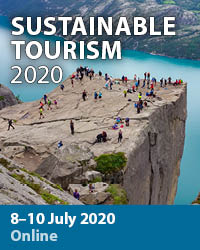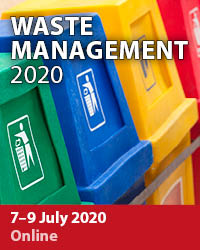9th International Conference on Sustainable Tourism
8–10 July 2020
Online
Overview

With the main objective to preserve our delegates’ well-being, but also with the belief that the scientific community should not be stopped, WIT decided that Sustainable Tourism 2020 should not take place as scheduled, in Madrid, Spain, but take place as an online event instead.
The conference was organised by the Wessex Institute, UK, represented by Professor Juan Casares, Member of the WIT Board of Directors.
The conference, which started in Segovia, Spain in 2004 is well-established and always attracts a wide international spread of delegates.
Tourism has become an important component of present-day development, not only in economic terms but also for knowledge and human welfare, and is an activity accessible to a growing number of people.
Tourist activities have many more advantages than disadvantages. New forms of economic development and increasing wealth of human societies depend on tourism.
The tourism industry has nevertheless given rise to some serious concerns, including social costs and ecological impacts. Many ancient local cultures have practically lost their identity. Their societies have oriented their economy only to this industry. Both the natural and cultural - rural or urban – landscapes have also paid a high price for certain forms of tourism. These problems will persist if economic benefit is the only target, leading to short-term gains that eventually become ruinous.
Sustainable Tourism 2020 aimed to find ways to protect the natural and cultural landscape through the development of new solutions which minimise the adverse effects of tourism. This can be achieved through new strategies involving the active collaboration of society as a whole.
Opening of the Conference
The conference was opened with a presentation of the Wessex Institute followed by an opening address to the Sustainable Tourism Conference Series, welcoming delegates to this year’s event.
Invited Presentations
There were a series of invited lectures on advanced topics of research and applications, as follows:
- “Local active engagement as effective tool for sustainable tourism development. First considerations from the European cultural routes case”, by Sabrina Meneghello of Ca' Foscari University, ITALY
- “An alternative view of Croatian tourism”, by Mauro Dujmovic of University of Pula, Croatia
- “Tourist behaviour and tick borne disease risk”, by Sandra De Urioste-Stone of the University of Maine, USA
- “Remote island tourism - Case study in Fiji”, by Hiroshi Kato of Hokkaido University, Japan
- “Rewilding urban areas to maintain ecosystem services and ecological tourism. The case of Saler’s Devesa (València)”, by Jose Luis Miralles i Garcia, of the University of Valencia, Spain
- “Participatory rural planning and local capabilities toward offering nature tourism”, by Romano Gino Segrado Pavon, of the University of Quintana Roo, Mexico
Conference Sessions
The papers presented during the conference were classified under the following headings:
- Tourism as a tool of development
- The impact of tourism on heritage and culture
- Tourist behaviour
- Ecotourism, sports tourism and sustainability
- Rural tourism and protection of landscapes
- Local communities and tourism
Conference Publication
Papers presented at this conference are published in Vol. 248 of the WIT Transactions on Ecology and the Environment (ISSN 1743-3541). Papers presented at the meeting are available Open Access in the eLibrary of the Wessex Institute (https://www.witpress.com/elibrary) from where they can be freely downloaded by any interested parties.
One paper was selected for publication in the International Journal of Transport Development and Integration. This Journal covers all transportation modes and the general topic of transport systems, with particular emphasis on their integration and harmonisation. The variety of topics covered by the Journal reflects the complex interaction of transportation systems and the environment, and the need to establish integrated strategies.
Closing of the Conference
WIT is aware that one of the benefits of the conferences is the networking among colleagues and the only reason for implementing this strategy is the exceptional circumstances created by the COVID-19 crisis. Thus, to allow the authors to maintain that capability, delegates registered for this conference, and had their paper accepted for publication, are able to attend the next conference in the series (or a different conference of their choice devoted to similar topics that takes place prior to that) free of charge, and if they wish, make an oral presentation of their published paper.
We would like to thank the delegates for participating in the event and look forward to meeting them at the next conference in the series.
Related Conferences
Urban and Maritime Transport 2021, 16–18 June 2021
Sustainable City 2021, 5–7 October 2021
Energy and Sustainability 2021, 6–8 October 2021
